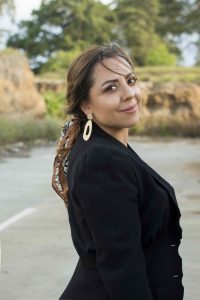Interview with lawyer and human rights expert Renata Ávila
El 13 de septiembre de 2019 en Actividades Culturales/Cultural Activities por ralvarezt | Sin comentarios

We interview international human rights lawyer from Guatemala, Renata Avila, specialising in the next wave of technological challenges to preserve and advance our rights, and understand better the politics of data and their implications on trade, democracy and society.
Ávila, Executive Director of the Intelligent Citizenship Foundation, gives a talk this afternoon at the London School of Economics (LSE) in which she will discuss the 30 years of the Web and how the the last decade has been the most challenging for our societies to preserve and advance freedom of speech.
Your talk this afternoon is «2009-2019: a revolutionary decade for freedom of expression». As an international human rights lawyer, what stands out from these last ten years of the Web?
We’re in a new time where new political pacts are necessary. Last year we reached a historical precedent: half of humanity connected to the web. It should be a reason for joy and acceleration of inequality reduction, access to knowledge and of taking advantage of collective intelligence to solve the serious crises that afflict us. And yet, the architecture in which this occurs has blocked various possibilities. Today connectivity awakens democratic alarms, accelerated consumption and still the danger of losing our free will. Power and economic benefit, as well as the rules that determine what we can or cannot do online are concentrated in the hands of few. It is now urgent to reverse this and return the power of technology to the people.
– Do you think that freedom of expression has advanced thanks to the use of the Web?
Definitely. We have more formats, media, search possibilities, receive, share and publish information and opinions, never before in the history of mankind.
– You talk is about complaint boxes and valuable publications on the Web, but also about the decline in the right to freedom of expression. Do you think our rights are at risk?
Plus than ever in the last forty years. I would like to highlight two aspects that concern me very much: the first, censorship in the hands of corporations, without due process and judicial review. Before the online censorship was tangible: you could see a blocked site, not accessible. You could protest against it. You could even intuit the motives of a blocked site. But now censorship is invisible, intangible and does not render accounts or give explanations: legitimate opinions or, at least, debatable, are removed from the channels of hyper – personalised information without us even noticing. We have lost the agency to combat or even audit the censorship of today. We have abdicated a public power to technological giants.
– In your talk, you will analyse key moments and events that have transformed the right to freedom of opinion and expression online during the last decade, is it possible to summarise this?
Our transit from computers to mobile phones marks a new dynamic, such as marking the transit to technology 5G in the next stage, from which it will be virtually impossible to disconnect.
For Freedom of expression, WikiLeaks without a doubt, was the revolution of the decade, transferring the power of information to people and inviting them to change the system, exposing institutional corruption entirely. Snowden continues the mission, showing us
the political game between technology companies, intelligence agencies and even the military. Mass surveillance and accessibility to the powerful plus the erosion of accelerated privacy are undoubtedly moments that reach their highest point in recent three years. It has been hard to wake up, but more and more people realise the impact of these digital despots we have unwittingly fed our data to for years. And how they threaten our future.

– As an international human rights lawyer, what advice do you give to young people who want to follow their path?
Highlight that our rights are at greater risk than ever, rights for which grandparents fought wars, so that parents planted themselves in protests. All advances in the matter can be crushed with the increasing criminalisation and setbacks in the right to freedom of expression. We must get used to demanding them and asking for more, asking for their progress, informing ourselves about them and updating them to our realities today. I think of recent cases where the labor rights of drivers are protected from Uber, for example. No matter what profession we exercise, we should all know the Universal Declaration of Human Rights by heart and apply it to our daily lives. Apply at least and always ask for more, always ask for advances that dignify
and protect humanity.
Entradas relacionadas
Etiquetas
expression freedom freedom speech human rights LSE Renata Ávila
Deja un comentario
© Instituto Cervantes 1997-2025. Reservados todos los derechos. cenlon@cervantes.es


